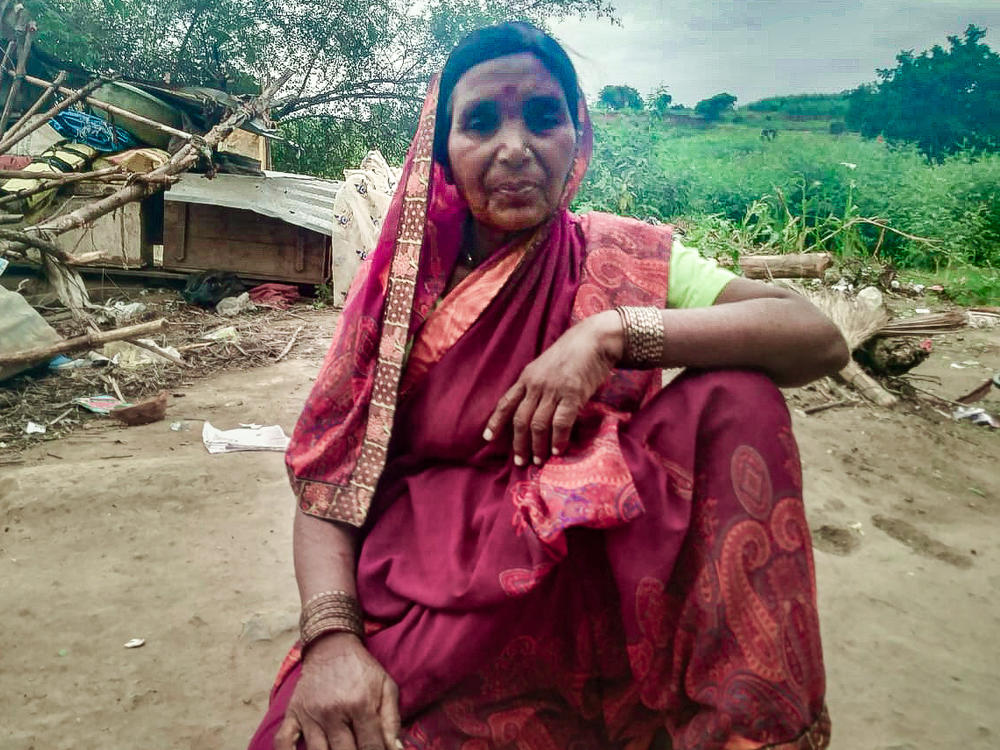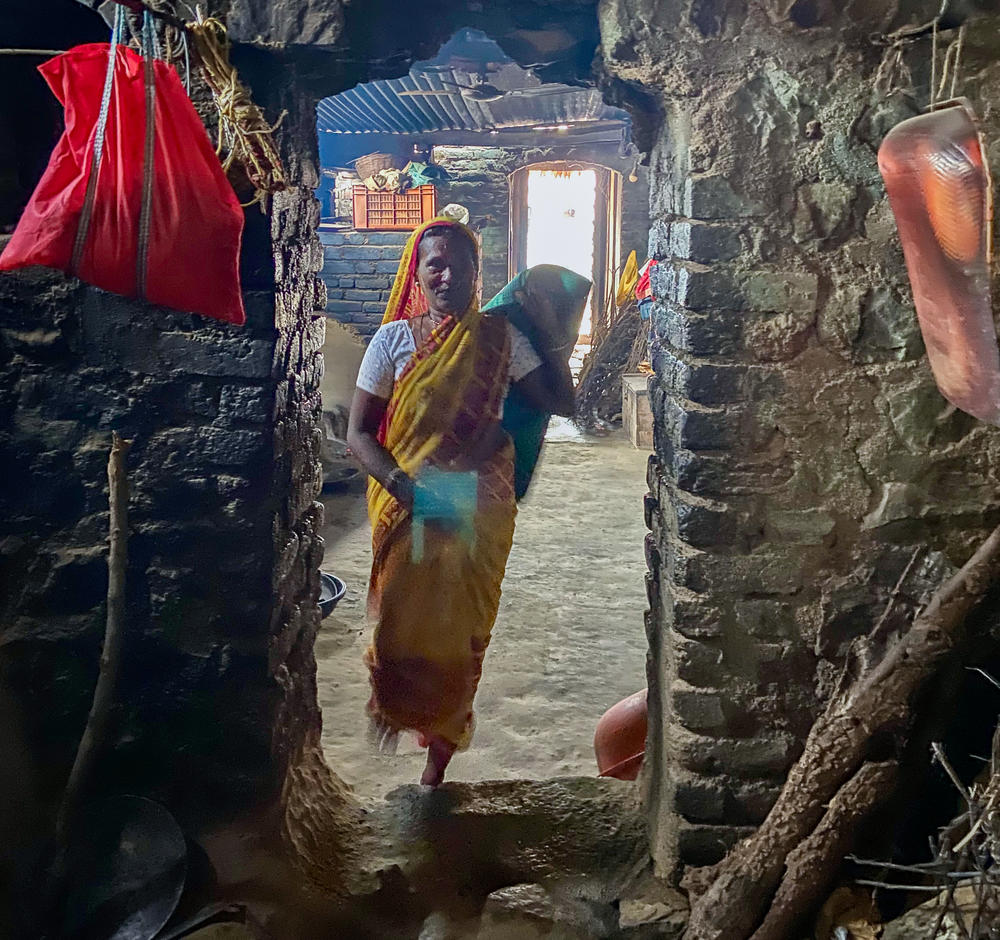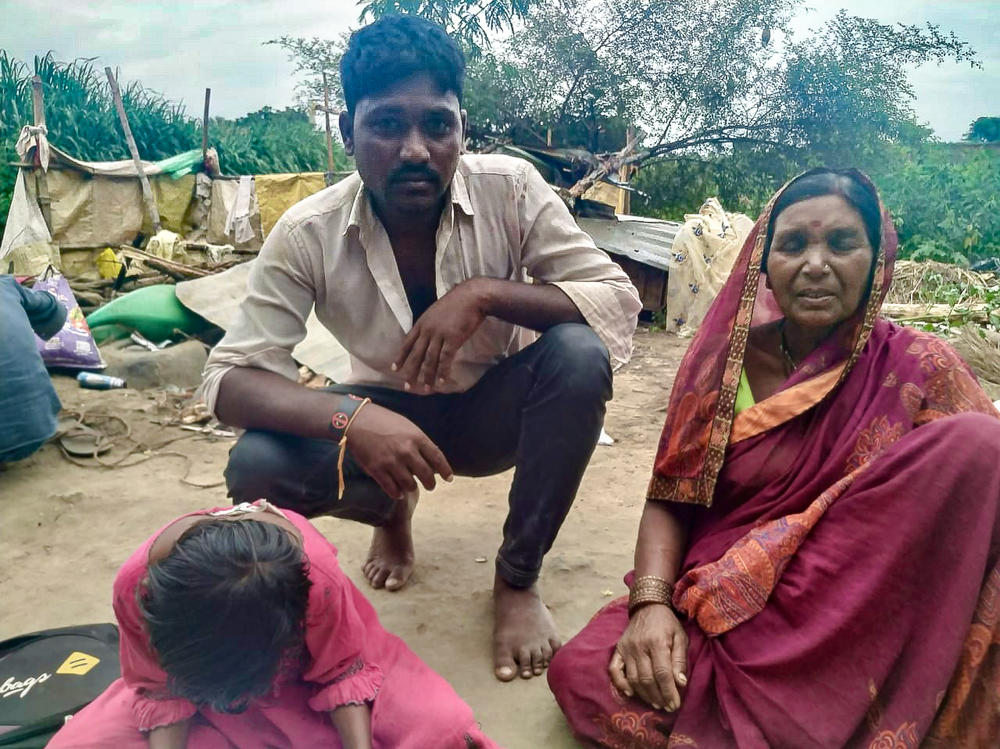Section Branding
Header Content
Captive in a chicken coop: The plight of debt bondage workers
Primary Content
For nearly a week last summer, Shanta Bai, a farmworker, says she was held captive in a chicken coop in a remote farm on the outskirts of a village in southern state of Karnataka in India. She was locked in the cramped quarters with other women. They used the corner of the coop for going to the bathroom.
Her husband, Jairam, also a captive, was tied up in a cowshed nearby.
The couple say they were were among a dozen farm workers from the neighboring state of Maharashtra who were being held in what's called "debt bondage" by the contractor who had brought them to work in the farms during the sugarcane harvest season. That phrase means they owed money to the contractor and would not be released until they (or their relatives) repaid the debt.
"We were told that we hadn't done sufficient work to cover the amount he had paid us. He said we owed him two lakh rupees [the equivalent of $2,400], and he wouldn't let us go unless we paid him back," said Shanta Bai as she lit a small bonfire to prepare dinner — a modest serving of lentils and flatbread, outside her one-room house in Dharur, a village in Maharashtra's Beed district.
Shanta Bai is a laborer who is hired by contractors to work in sugarcane fields and sugar factories in the region that has been dubbed the "sugar-belt" of India. "The mukkadam [contractor] said that I did not work as per the contract, but every day I filled two whole vehicles with harvest, without taking a day off, even on days I was sick, he expected us to work," she told NPR.
Jairam was likely tied up because he was considered a greater flight risk than his wife. During their captivity, "all they fed us was a little rice and water, once a day," he recalled. "The place we were kept in was filthy. He also took away our phone so we couldn't call for help."
A lifetime in the sugarcane fields
Raised near the sugarcane fields, Shanta Bai started farm work at an early age, helping her parents during harvest season. "I have been working for over 40 years, since I was a child. My earliest memories are on the sugarcane fields and later in the sugar factories," she said.
Later, after she was married to Jairam, the two of them formed a koyta — a term used colloquially to define a unit of two laborers, usually a married couple — and sought out similar work from mukkadams in their village.
"There is a contract between the farm owner or factory workers and the mukkadams, who get paid in advance and also pay the koyta in advance," explained D.L. Karad, national vice-president of the Centre of Indian Trade Unions, based in Nasikh city in Maharashtra. "They are then transported — often crammed in trucks or on tractors — to the farms where they are expected to live and work in squalid conditions," he added. And in these remote locations, they they have little to no access to resources, medical care or any form of legal support, he said
While there, workers are expected to deliver a certain number of days of work corresponding to the amount of money they received. "But if for any reason, they are unable to provide work equivalent to the amount they received, they are expected to pay the mukkadam back. This is the very definition of bonded labor," he said.
Why bonded labor persists despite a ban
Bonded labor — considered a type of forced labor because of its coercive terms — dates back centuries. In India, it arises from the feudal systems supported by the caste hierarchy, which persists despite being outlawed — and that makes it difficult for members of lower castes to find dignified jobs that pay fair wages, said Karad.
Although the Indian parliament banned bonded labor in 1976 for infringing on human rights, it was never fully eliminated. Bodies like the International Labour Organization documented a reduction in the prevalence of bonded labor but found that it continued in various forms in rural areas, often targeting people from communities that were marginalized by India's caste system.
Getting an actual count of forced laborers is a challenge. Since this type of labor is still banned, the data reflects only cases reported to the state police: a total of 2,235 cases of forced labor registered in India in 2021, an increase from 1,141 in 2019. However, Karad says, based on the anecdotal gathered by his organization, the numbers of unreported cases are significantly higher in just the state of Maharashtra alone.
"We have demanded the government to conduct a statewide economic survey of the workforce. Our own studies place this number of bonded workers at [850,000], but considering the migrant nature of the work, it could be higher, perhaps even more than [1.1 million]," Karad said, sharing estimates from a village-to-village survey the organization conducted in 2019. "Nearly 40% of these are women," he added.
Climate change leads to more 'debt bondage' jobs
Earth's changing climate forced more people to seek these "debt bondage" jobs, researchers say. When local harvests fail due to drought, workers on these farms may feel they have no option other than to travel to places where they can earn a living, even if that means they must agree to forced labor conditions.
And paying back the contractors is more difficult now as well. Record levels of heat may mean the bonded laborers can't put in as many outdoor hours or may have to work at a slower pace, says Shouro Dasgupta, an environmental economist and visiting fellow at LSE, who has studied the impact of climate change on the labor force in the Indian subcontinent.
The sugar industry – India was the leading global sugar producer until last year – has been hit by an increasing number of droughts that have taken a toll on a crop that consumes a lot of water.
In fact, the driest August experienced in 123 years has threatened to reduce sugarcane output in the state for the coming year, expected to be the lowest in four years.
So farm and factory owners, faced with a diminishing yield, often pay workers poorly. "Currently, their advance would work out to Rs 276 [a little over $3] for cutting one ton of sugarcane. This amount, however, is below minimum wage and has not been revised since 2014," Karad said.
At this pay rate, he added, it is unlikely that most families will be able to pay back the amount they receive, forcing them to borrow more money and remain in debt bondage. "It's a vicious circle," Karad said.
Sixty-year-old Kamala Bai has seen many such cases in the nearly five decades she's spent working on the sugarcane farms and factories. "There is not one family here [in their community] who hasn't experienced some form of exploitation, some were even forced to suicide to escape the cycle of debt they were stuck in," she said, telling ofa woman who's husband, deep in debt to his contractors, took his life.
A veteran of the debt bondage system, she now mobilizes workers in her community to demand better wages and dignified treatment — proper housing, food, clean water and regular medical care when they take on a job. "Working with the activists here, I have become more aware of my rights, and now regularly lead a group of farmworkers, most of us are women to join in protest at the district office [for the government's labor department]," she adds with pride. The protests have focused on pensions for farm workers and investigation of cases of medical negligence. She said they were assured that action will be taken but have not yet seen any results.
What finally happened with Shanta Bai and Jairam
Shanta Bai and Jairam did eventually get back home after nearly a month in captivity.
After having not heard from his parents in almost a week, their eldest son had traveled to farms across the region looking for them. "They had taken our phones so we couldn't call him. But he found us and begged for our release, but the mukkadam didn't budge," Shanta Bai said. "He had to then to take a loan from another contractor to pay for our release," she said. Like his parents, he would have to work off his loan in the fields in the coming harvest season.
The son paid the equivalent of about $1,800 to the mukaddam to secure his mother's release. Jairam was held longer since the family could not procure the full amount the contractor demanded. "We paid another 50,000 rupees to get him released," she said, adding that the contractor threatened them to keep them from speaking to the police.
"He said if we complained to the police he would kill us. We got scared and left with nothing. He took everything; our phones, clothes, pots and pans, our mattress and bedsheets and leftover ration. What could we do? We have no power. We are poor people," Shanta Bai said.
"We need to be compensated for what we lost, our money, our phone, even our utensils and beddings. How can any man [have the power to] just take away our entire life?" she questioned.
Despite the trauma of being held captive, the couple is preparing for another stint this winter with the hopes of paying back the loan their son took for their release. They are hoping that the contractor who lent their son the money to free them will be a sympathetic employer, providing them with sufficient work to cover their debts.
Ruchi Kumar is a journalist who reports on conflict, politics, development and culture in India and Afghanistan. She tweets at @RuchiKumar
Copyright 2023 NPR. To see more, visit https://www.npr.org.




